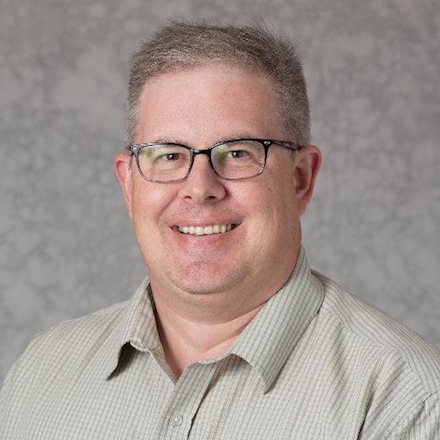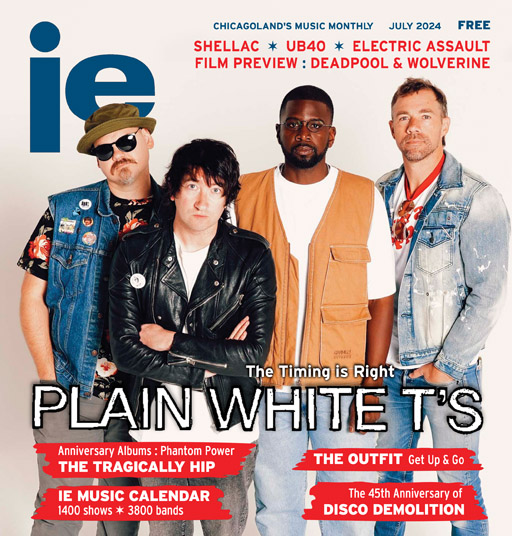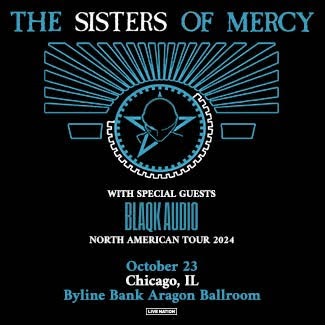Media: July 2017
When Len O’Kelly was working in Chicago as a music director and disc jockey for radio stations like WJMK (104.3), academia was the furthest thing from his mind. At the time he was a college dropout and working in one of the top markets in the country. He thought he’d be doing that the rest of his life. But a stint in Grand Rapids radio led to a post at Grand Valley State University, and before he knew it, the college dropout had become Dr. Len O’Kelly.
“While working here I finished up my masters, and I wanted to teach full time, so they said I needed to get my PhD. I was motivated to do that. My dissertation was about ’60s rock and roll and whether or not there was racism in those playlists, and it gave me an opportunity to talk to the all-time radio legends – John Records Landecker, Ron Britain, Herb Kent, a lot of the Grand Rapids guys.”
He is now teaching several media courses at Grand Valley State, and loving it. The best part of the job, as far as O’Kelly is concerned, is mentoring the next generation of broadcasters. His background gives him some credibility. “I do let them know I was on the air in Chicago, but I don’t like to share too much. I don’t want it to be me telling war stories. I’m seriously trying to teach them what broadcasting and media is all about. I take them through every aspect of the radio station. We cover on-air performance, news, sports, ratings, and as part of that course they are required to work at the campus station. As their final project, they have to apply to me with a demo and resume.”
That kind of hands-on experience is really what they need if they’re serious about pursuing a career, and O’Kelly doesn’t pull any punches when he explains the current reality. “I do let them know it’s gonna be tricky for them to get started. Big companies like iHeart [Radio] aren’t taking internships anymore because of the corporate rules. That has caused me to get creative and go to little stations in places like Holland, Michigan who still allow students to come in and learn every aspect of the station. I’ve been working with the (syndicated) ‘Free Beer and Hot Wings’ show and they’ve been great about bringing in interns and allowing them to do more than just get coffee. They’re good to the kids, they leave their egos at the door, and they actually teach the kids a thing or two along the way. I’ve had more than one student come out of there saying ‘Boy I’d really like to do this.’”
The students also get to experiment on the campus station. That’s where many more of them develop their love for the medium. “The radio station is internet only and delivers it directly to phones where is where students are listening anyway. The station doesn’t have a format. I want them to do what they are interested in. I had a guy a few years ago who did an all Star Wars talk show. It ran two and half years. It was outstanding, and a lot of fun. Another group did ‘Bedtime stories for grownups’– interpretations of literature. Some want to play music, and they play all kinds – rock, country, hip hop. That’s what I want. I want them to communicate with the audience of their peers in the language they want to hear.”
This led to the development of a more advanced curriculum. “We did an advanced radio course for the first time last year, and it filled right away. We started studying things like National Lampoon’s Radio Hour, Firesign Theater, and the Conception Corporation, and they ended up writing their own comedy and long form segments. There is a lot of interest in wanting to do radio, and wanting to tell stories. The interest really isn’t so much in music formats. They feel like their generation is not being heard, so they want to do talk radio. Talk radio has been relegated to the 65 and older set, and you’ve got a bunch of 20-somethings who want to consume it, but they are forced to go podcasts to get it. You don’t get the same sense of community there.”
That’s something the broadcasting industry needs to hear. O’Kelly is working hard to get that message out there, and his students are his best messengers. “There was a girl who was on our station for a year – Ashley Z – and she’s now doing nights in Atlanta. Last year one of our entertainment show demos was entered into the Michigan Association of Broadcasters competition and they took second place for best radio personality in the state. A lot of them want to do it.
It’s not a dying medium in their eyes at all – the reports of radio’s demise are greatly exaggerated. Generation Z (the generation after the Millennials) has exceptionally high usage for radio – AM & FM – because they came of age during the recession. Free entertainment was part of their lives. They listen to radio, but they are looking for ways to engage with it. They are clamoring for that. Radio has to figure out a way to give them that opportunity.”
Message delivered. We still need to see if the message is received.
– Rick Kaempfer











